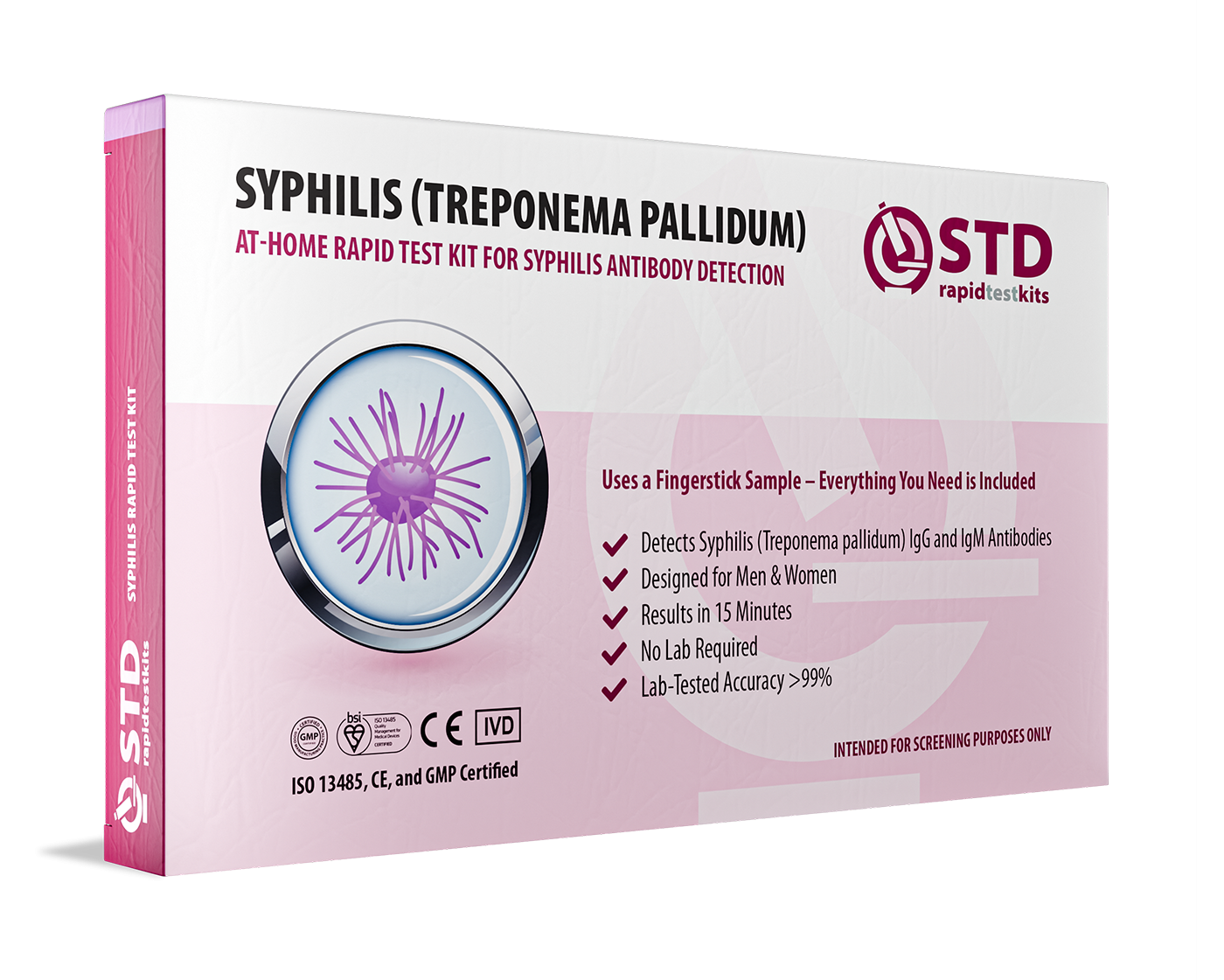What Happens in Vegas Doesn’t Always Stay in Vegas
Imagine this: a tourist couple from Phoenix spends a weekend in Vegas. They drink, dance, end up kissing strangers on a casino floor. No actual sex, no condom to forget, just the thrill of the moment. A few weeks later, one of them notices a painless sore in their mouth. It doesn’t hurt, so they ignore it. By the time the rash hits their palms, they’re already contagious with syphilis.
Or think of Maria, a grocery clerk in North Las Vegas. She’s been in a monogamous relationship for years. She doesn’t think about STDs. But during her pregnancy, she isn’t tested early enough. When her baby is born with congenital syphilis, she learns, too late, that infections can linger undetected for months or years, long before her current relationship. These stories aren’t outliers. They’re part of the reason Nevada’s numbers keep climbing.
In 2025, the CDC ranked Nevada near the top nationally for syphilis rates, and Clark County reported a 1,567% rise in congenital cases over the last decade. That’s not a typo, it’s a surge fueled by missed screenings, underfunded health systems, and silence that leaves infections unchecked. The Las Vegas Sun called it an “epidemic hiding in plain sight.”

People are also looking for: How Chlamydia Can Affect Babies When the Mother is Infected
Symptoms That Keep People Guessing
The trickiest thing about syphilis and its STD cousins is how easily they disguise themselves. That sore on your genitals or mouth? It’s painless, so you may never notice. The rash on your hands or feet? Looks a lot like eczema or an allergic reaction. A fever, sore throat, or fatigue? Could just be a cold. By the time syphilis slips into its latent stage, you may have no visible signs at all, yet it’s still doing damage internally and can still be passed to a partner or baby.
Gonorrhea and chlamydia play the same game. Many people have no symptoms at all, or just vague irritation that they chalk up to “Vegas water” or a yeast infection. This is how infections keep spreading. They thrive on silence, shame, and delay.
Vegas Nights, Vegas Numbers
Clark County is home to almost three-quarters of Nevada's people, and it also has the most STDs in the state. In 2024, local health data showed that hundreds of new syphilis cases were reported every three months. In just a few years, congenital cases had tripled. These aren't just numbers; they're kids who are born with health problems that could have been avoided, young adults who are dealing with infections that haven't been treated, and whole neighborhoods where it's hard to get tested.
Nevada is often in the top five for syphilis and gonorrhea cases in the country, ahead of states like Arizona, Utah, and California. Some people think the Strip is just for tourists and sex work, but the truth is more complicated. Yes, the nightlife plays a role. But infections can also spread in homes, high schools, and workplaces in the suburbs. That's why the saying "what happens in Vegas, stays in Vegas" is very wrong. In reality, what happens in Vegas gets around, going from Phoenix to LA to Boise, through people who don't know they have an infection.
Strip Clubs, Hookups, and the “Vegas Exception”
There’s a cultural script people slip into when they land in Las Vegas: rules don’t apply here. A married man goes to a strip club for the first time in his life, convinced that lap dances are harmless. A bachelorette party kisses strangers on Fremont Street, laughing that it’s “just Vegas fun.” A college student from Reno decides to skip a condom because “it’s just this once.” The problem? STDs don’t care about context. They don’t care that you’re “not that kind of person” back home. The bacteria only need one encounter, one exchange of fluids, or one moment of skin-to-skin contact.
What’s more, stigma makes people underestimate risk. Sex work in Nevada is highly regulated in rural brothels, but outside those areas, where it’s illegal, the encounters often happen without protection, testing, or support. And because Nevada carries the image of being more sexually permissive, people sometimes assume risk is “built into” the environment. This thinking discourages testing, as if an infection is inevitable or shameful rather than simply a health condition that can be prevented and treated.
Check Your STD Status in Minutes
Test at Home with RemediumSyphilis Test Kit

 For Men & Women
For Men & Women Results in Minutes
Results in Minutes No Lab Needed
No Lab Needed Private & Discreet
Private & DiscreetOrder Now $33.99 $49.00
From Strip Malls to Prenatal Clinics
But it’s not just the Strip. In fact, some of the most devastating impacts are showing up far from neon lights. Take the quiet neighborhoods of Henderson or North Las Vegas, where young families juggle work, school, and childcare. Prenatal clinics here report missed opportunities for early syphilis screening, often because patients can’t afford multiple visits or the clinic itself is underfunded. In 2025, the CDC highlighted Clark County as a hotspot for congenital syphilis precisely because mothers weren’t tested, or weren’t re-tested later in pregnancy when infections could have been caught.
This is how the epidemic stretches from strip clubs to strip malls: nightlife culture fuels transmission, while limited healthcare access allows it to spread unchecked in everyday households. Both pieces of the puzzle matter, and both show why Nevada is topping charts that no state wants to lead.
Myths That Keep the Epidemic Alive
One of the biggest myths in Nevada is that STDs are a “Vegas problem” that only affects tourists, sex workers, or people with multiple partners. The reality? Anyone can carry an infection, your coworker, your partner, the neighbor who never goes near the Strip. Bacteria don’t discriminate, but stigma convinces people that “good” people are safe and “bad” people are risky. That binary is not only false, it’s deadly.
Another myth is that condoms are an iron wall against syphilis. Yes, they drastically reduce risk, but they don’t cover every patch of skin. A chancre, the painless sore that marks early syphilis, can show up on areas condoms don’t protect: the base of the penis, the vulva, the anus, even the mouth. Skin-to-skin contact is enough. That doesn’t mean condoms don’t matter, they’re essential, but relying on them as the sole line of defense gives people a false sense of security.
Shame, Silence, and Missed Chances
Ask any public health nurse in Clark County what makes their job hardest, and they’ll tell you: silence. People don’t get tested because they’re afraid of being judged. A young man from Henderson told me he avoided testing for months because he didn’t want anyone at the clinic to recognize him from church. By the time he finally got checked, his infection had spread to his bloodstream. The shame didn’t just hurt his pride, it cost him his health.
And then there’s the silence in pregnancy care. Nevada has one of the highest rates of congenital syphilis in the country, not because pregnant people don’t care, but because stigma and healthcare gaps keep screenings inconsistent. Imagine being a mother who went to every prenatal appointment she could manage, only to learn after birth that her baby’s illness could have been prevented by one missed test. That’s not individual failure, it’s systemic neglect, fueled by stigma that makes providers and patients alike avoid tough conversations about sex.

People are looking for: How Gonorrhea Can Cause Arthritis
Rewriting the Script: Prevention that is Sex-Positive
How do we change the story, then? By changing how people in Nevada think about prevention. We need real conversations about care instead of lectures about morality. Testing isn't about making you feel bad; it's about giving you peace of mind. Condoms are more than just a way to stay safe; they are also a way to show respect. And treatment isn't a punishment; it's a chance to get better.
Think of prevention as layers: condoms, regular checkups, honest conversations with partners, and getting treatment when you need it. In a city where keeping things secret is almost a selling point, bringing infections into the open may be the most rebellious thing you can do. Picture a society where going to a Las Vegas clinic or ordering a test kit to use at home is seen as a sign of strength, not shame. That one change could change the course of Nevada's epidemic.
Testing: Not Just After Vegas, But Always
Here’s the truth: you don’t have to wait for symptoms. You don’t have to wait for a hookup. And you don’t have to wait for fear to gnaw at you after a weekend on the Strip. Regular testing is the difference between catching syphilis early, when a shot of penicillin cures it, and letting it hide for years until it causes heart or brain damage. Infections love silence. Testing breaks it.
For locals and tourists alike, the fastest, most discreet option is often an at-home test. No waiting rooms, no sideways glances, no awkward explanations. In Nevada, where stigma still silences too many, a test delivered to your doorstep can be the bridge between fear and freedom. Peace of mind is one prick of the finger away.
FAQs
1. Can you actually get syphilis from kissing someone in Vegas?
Sounds like a horror story your friend might tell after too many shots, right? But yes, if they’ve got an open sore in their mouth, one sloppy make-out can pass it along. If there’s no sore, you’re safe. The tricky part? Those sores are often painless and invisible. So people don’t even know they have them.
2. What if all I did was dance, grind a little, no actual sex?
Bodies touching is still risk. Think of a packed nightclub: sweat, skin, the waistband of jeans brushing against a sore no one notices. That’s enough for syphilis to spread. No penetration needed. Vegas isn’t magic, it’s biology.
3. I came home with a weird rash after a Vegas trip. Should I freak out?
Don’t panic, but don’t ignore it. A syphilis rash can look like bug bites or eczema, and it often shows up on your palms or soles. If it’s been a few weeks since that wild weekend, it’s worth testing. Worst case, you lose an hour of your time. Best case, you catch something early and handle it before it does real damage.
4. Isn’t this just a tourist thing? I live here, I don’t party on the Strip.
Locals actually carry most of the burden. Congenital syphilis, the kind passed to babies, has spiked in Clark County. That’s not about bachelorette parties, that’s about missed tests in ordinary families. Whether you party or not, Nevada’s healthcare gaps make everyone more vulnerable.
5. I don’t have symptoms. Why should I bother testing?
Because “no symptoms” doesn’t mean “no infection.” Chlamydia and gonorrhea can sit silently for months, quietly damaging fertility. Syphilis can vanish into a latent stage where you feel fine but it’s busy harming your heart or brain. Testing is the only way to know. Feeling fine is not a green light.
6. Is syphilis really curable, or is it one of those lifelong things?
Syphilis is 100% curable with antibiotics, usually a penicillin shot. The scary part isn’t whether it can be cured. It’s whether people catch it soon enough. Early test, early cure. Wait too long, and the damage can’t always be undone.
7. I’m embarrassed to go to a clinic. What if I bump into someone I know?
Totally normal fear. That’s why at-home STD tests exist. No waiting rooms, no awkward run-ins. Just privacy, answers, and peace of mind. It’s testing built for people who’d rather keep their health business their own.
8. Do condoms protect me from everything in Vegas?
Condoms are superheroes, but they’re not invincible. They stop fluids like semen and vaginal secretions, which covers a lot. But syphilis sores can appear in spots condoms don’t cover, like thighs or mouths. So yes, use them. Always. But know they’re part of the defense, not the whole fortress.
9. How fast can I get results if I test in Nevada?
Depends where you go. Some clinics offer same-day rapid tests. At-home kits can give you answers in minutes. Hospital labs might take a couple of days. The bottom line? You don’t have to wait weeks. The tech is here to get you clarity fast.
10. Are STDs in Vegas worse than other cities?
The rates are higher, yes. But it’s not because people here are “wilder” or “dirtier.” It’s about how tourism, stigma, and healthcare deserts collide. Vegas is a mixing bowl of people from everywhere, and when testing falls through the cracks, infections stick around. It’s not about morality, it’s about math.
Check Your STD Status in Minutes
Test at Home with Remedium8-in-1 STD Test Kit

 For Men & Women
For Men & Women Results in Minutes
Results in Minutes No Lab Needed
No Lab Needed Private & Discreet
Private & DiscreetOrder Now $149.00 $392.00
For all 8 tests
Vegas, Neon, and the Need for Clarity
Las Vegas sells fantasy: what happens here stays here. But when it comes to STDs, the truth doesn’t play by those rules. Nevada’s numbers show that infections travel, between tourists and locals, from strip clubs to strip malls, across bedrooms and borders. The epidemic isn’t fueled by “bad behavior.” It’s fueled by silence, stigma, and missed chances.
You deserve better than silence. Whether you live in Henderson, Reno, or you just spent a weekend under neon lights, your health is worth clarity. Testing isn’t a confession, it’s an act of care, for yourself and anyone you love. And if you’re worried right now, there’s no reason to wait. Order your rapid test today and end the guessing game.
Sources
1. Nevada Current: Rate of babies born with syphilis in NV
2. Las Vegas Sun: Congenital syphilis alarm
3. Associated Press: States lost millions for STD prevention
4. CDC: Syphilis Treatment Guidelines
5. CDC: State STI ranking tables










